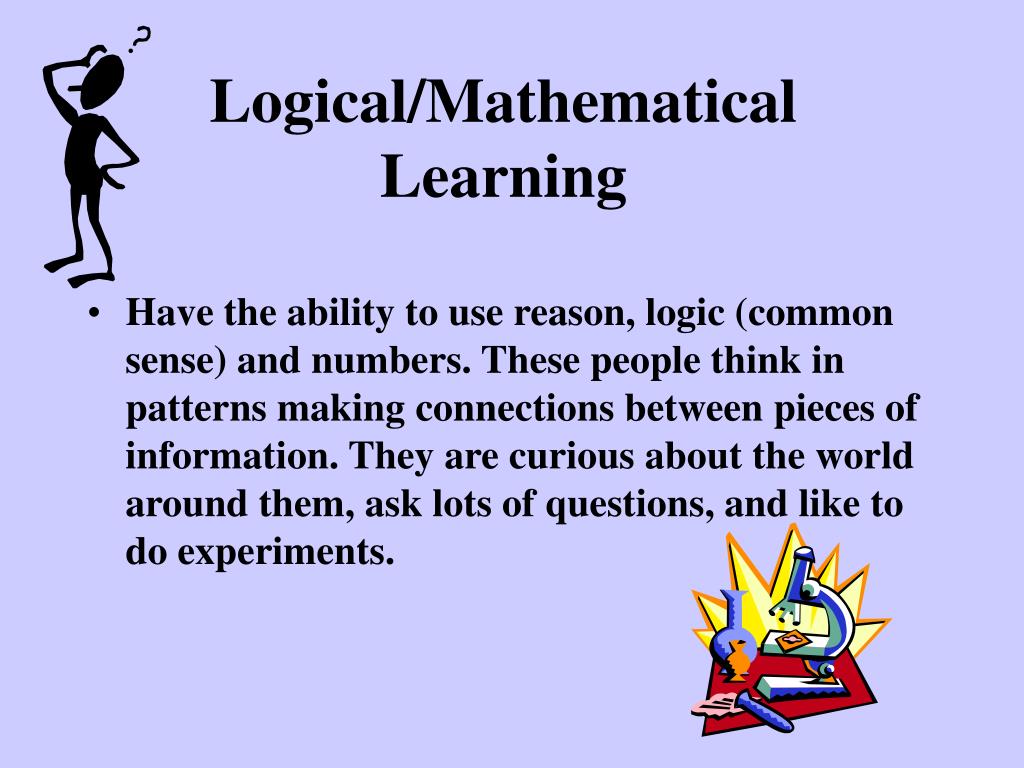Logical-Mathematical Learning: Nurturing Critical Thinking and Problem-Solving Skills
Introduction:
In the realm of education, it is widely recognized that each child possesses a unique learning style. While some students excel in artistic or linguistic pursuits, others exhibit a natural inclination towards logical-mathematical thinking. Logical-mathematical intelligence refers to the ability to reason logically, think critically, and solve problems using mathematical concepts. This form of intelligence was first introduced by psychologist Howard Gardner as part of his theory of multiple intelligences. In this article, we will explore the characteristics of logical-mathematical learners and discuss effective strategies for nurturing their abilities.
Characteristics of Logical-Mathematical Learners:
Logical-mathematical learners demonstrate certain key traits that distinguish them from other types of learners:
1. Analytical Thinking: These students possess excellent analytical skills and are adept at breaking down complex problems into smaller components for easier understanding.
2. Strong Mathematical Aptitude: They have a natural affinity for numbers and patterns, enabling them to grasp mathematical concepts quickly.
3. Logical Reasoning: Logical-mathematical learners excel in reasoning tasks that require step-by-step analysis or deduction based on evidence or premises.
4. Problem-Solving Orientation: They enjoy challenges and thrive when presented with puzzles or complex problems that require critical thinking skills to find solutions.
5. Attention to Detail: These learners display a keen eye for detail and precision while analyzing information or solving equations.
6. Systematic Approach: They tend to be systematic in their thinking processes, favoring organized structures and following logical sequences when solving problems.
7. Metacognitive Abilities: Logical-mathematical learners possess strong metacognitive skills which enable them to monitor their own thought processes effectively, identifying errors and adjusting strategies accordingly.
Nurturing Logical-Mathematical Intelligence:
To foster the growth of logical-mathematical intelligence in students, educators and parents can employ various strategies:
1. Incorporate Hands-on Activities: Engaging students in hands-on activities, such as building models or conducting experiments, helps them apply logical-mathematical concepts in real-world contexts.
2. Encourage Problem-Solving Challenges: Providing students with challenging problems that require critical thinking and logical reasoning encourages the development of their problem-solving skills.
3. Promote Mathematical Games and Puzzles: Introducing mathematical games and puzzles not only makes learning enjoyable but also enhances logical thinking abilities while reinforcing mathematical concepts.
4. Utilize Technology Tools: Integrating technology, such as educational apps or online platforms, allows students to explore mathematical concepts interactively and engage in virtual problem-solving scenarios.
5. Foster Collaborative Learning Environments: Group projects or collaborative assignments encourage logical-mathematical learners to exchange ideas, discuss different approaches, and learn from their peers’ perspectives.
6. Emphasize Critical Thinking Skills: Teach students how to analyze information critically by evaluating evidence, identifying biases, and making informed judgments based on solid reasoning.
7. Provide Real-World Applications: Demonstrating the practical applications of logical-mathematical concepts helps students understand their relevance outside the classroom setting and fosters a deeper appreciation for these skills.
8. Offer Flexibility in Assessment Methods: Traditional assessments may not accurately reflect the abilities of logical-mathematical learners; therefore, providing alternative assessment methods like project-based evaluations or open-ended questions can offer a more comprehensive understanding of their capabilities.
Benefits of Logical-Mathematical Learning:
Logical-mathematical intelligence is an invaluable skill set that extends beyond academic success:
1. Enhanced Analytical Skills: Logical-mathematical learning develops analytical skills that are applicable across various disciplines throughout one’s life journey.
2. Improved Problem-Solving Abilities: By honing their critical thinking skills through logical reasoning exercises, individuals become adept at solving complex problems effectively and efficiently.
3. Heightened Decision-Making Skills: The ability to analyze information, weigh different options, and make informed decisions is a direct result of logical-mathematical learning.
4. Preparation for STEM Fields: Logical-mathematical learners are well-positioned for success in science, technology, engineering, and mathematics (STEM) fields due to their natural affinity for mathematical concepts.
5. Transferable Skills: The skills developed through logical-mathematical learning can be applied in various areas of life, including finance management, computer programming, data analysis, and strategic planning.
Conclusion:
Logical-mathematical intelligence is an essential facet of human cognition that plays a pivotal role in problem-solving and critical thinking. By recognizing the unique needs of logical-mathematical learners and implementing effective strategies to nurture their abilities, educators can help these students reach their full potential. Encouraging hands-on activities, promoting collaborative learning environments, incorporating real-world applications, and emphasizing critical thinking skills are just some ways to foster the growth of logical-mathematical intelligence. By doing so, we pave the way for a generation equipped with strong analytical skills capable of tackling complex challenges in all facets of life.

Leave a comment